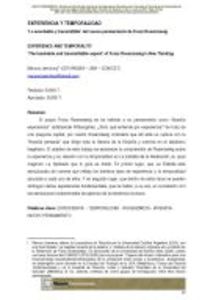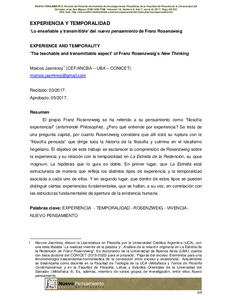Please use this identifier to cite or link to this item:
https://repositorio.uca.edu.ar/handle/123456789/6853| Título: | Experiencia y temporalidad : "lo enseñable y transmitible” del nuevo pensamiento de Franz Rosenzweig Experience and temporality : ‘The teachable and transmittable aspect’ of Franz Rosenzweig’s new thinking |
Autor: | Jasminoy, Marcos | Palabras clave: | TEOLOGIA; FILOSOFIA; Rosenzweig, Franz, 1886-1929; EXPERIENCIA; TEMPORALIDAD | Fecha de publicación: | 2017 | Editorial: | Instituto de Pensamiento Afroindoabiayalense de Buenos Aires | Cita: | Jasminoy, Marcos. “Experiencia y temporalidad : 'lo enseñable y transmitible' del nuevo pensamiento de Franz Rosenzweig” [en línea]. Nuevo Pensamiento 7(9), 2017 . Disponible en: https://repositorio.uca.edu.ar/handle/123456789/6853 | Resumen: | Resumen: El propio Franz Rosenzweig se ha referido a su pensamiento como “filosofía experiencial” (erfahrende Philosophie). ¿Pero qué entiende por experiencia? Se trata de una pregunta capital, por cuanto Rosenzweig considera que allí está su ruptura con la “filosofía pensada” que dirige toda la historia de la filosofía y culmina en el idealismo hegeliano. El objetivo de este trabajo es esclarecer la comprensión de Rosenzweig sobre la experiencia y su relación con la temporalidad en La Estrella de la Redención, su opus magnum. La hipótesis que lo guía es doble. En primer lugar, que La Estrella está estructurada de manera que refleja los distintos tipos de experiencia y la temporalidad asociada a cada uno de ellos. Y en segundo lugar, que dentro de estos tipos se pueden distinguir ciertas experiencias fundamentales, que se hallan, a su vez, en correlación con las estructuras fundamentales de apertura de la existencia humana. Abstract: Franz Rosenzweig has referred to his own thinking as an “experiential philosophy” (erfahrende Philosophie). But what does he understands by experience? This is a capital question inasmuch as Rosenzweig thinks that this is the point that marks his breaking with the “thought philosophy” that has been guiding all the history of philosophy until its culmination in Hegelian idealism. The purpose of this article is to explain Rosenzweig’s understanding of experience and its relation with temporality in The Star of Redemption. There are two main hypotheses. Firstly, that the Star has been structured to express the different types of experience and the temporality associated with each of them. Secondly, that inside these types, we can recognize some fundamental experiences which are, at the same time, in correlation with the basic structures of human existence. |
URI: | https://repositorio.uca.edu.ar/handle/123456789/6853 | ISSN: | 1853-7596 | Disciplina: | TEOLOGIA | Derechos: | Acceso Abierto | Fuente: | Nuevo Pensamiento 7(9), 2017 ISSN 1853-7596 |
| Appears in Collections: | Artículos |
Files in This Item:
| File | Description | Size | Format | |
|---|---|---|---|---|
| experiencia-temporalidad-ensenable-transmitible.jpg | 5,71 kB | JPEG |  View/Open | |
| experiencia-temporalidad-ensenable-transmitible.pdf | 335,35 kB | Adobe PDF |  View/Open |
Page view(s)
244
checked on Apr 27, 2024
Download(s)
120
checked on Apr 27, 2024
Google ScholarTM
Check
This item is licensed under a Creative Commons License

